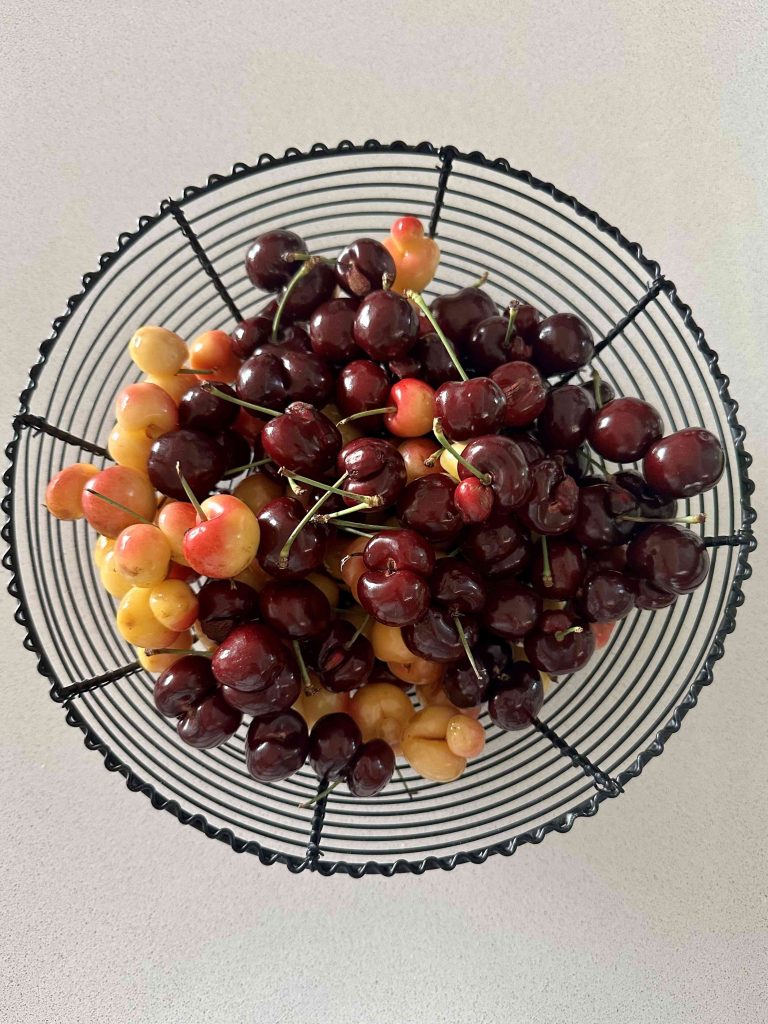In April, cherry blossom time, I turned 60 and my (even older) father shared with me a recording of the song Le Temps des Cerises, pensively sung here by Yves Montand:
In it the sweetness and heartbreak of past love are looked back upon with appreciation and without regret even though as impermanent as seasons of flowering and fruit. The song closes:
Ne pourra jamais calmer ma douleur…
J’aimerai toujours le temps des cerises
Et le souvenir que je garde au cœur.
(My pain will never cease, but I’ll always love the time of cherries and the memory I cherish in my heart).
This song came to mind again this week as fresh cherries began appearing in markets and at roadside stands. I stopped at one of these along the Pacific Coast Highway yesterday on my way home from a family celebration of my eldest son’s 31st birthday and bought a sack of dark red Bing cherries and one of golden-blush Rainiers.
So as not to over-sentimentalize the inherent poignancy of touching into the passage of time, the fruit stand was decorated with an over-abundance of American flags that these polarized days tends to signal a political-cultural stance far to the right of my own; the young man selling the cherries had the gaunt frame and bad teeth of a meth user; and I’d forgotten that the sales strategy of many roadside fruit vendors involves unloading batches of imperfect fruit rejected by mainstream markets. That was the case here, with plastic containers of cherries arranged with good-looking fruit on top and, as I soon discovered, misshapen cherries underneath. But the fruit was ripe and sweet, and my son and I drove up the canyon road leading from the ocean to the redwood forests on the ridge eating cherries and (full disclosure) flicking the pits out of the open car window.
There is so much more to consider about cherry time and this song: how it appears to be a nostalgic ballad but instead became the revolutionary anthem of the Paris Commune and other radical European movements–partly, it’s said, because cherries are also the color of blood. About Yves Montand, whose parents escaped Mussolini’s Italy across the Alps on foot; how he moved from being a Communist sympathizer to using his platform as a film star and French icon to advocate for right wing causes later in life. About the rise of political violence in the United States and where it will lead; and even about the Tibetan Buddhist concept of the bardo, a liminal space between death and rebirth, or one state and the next. About one of my favorite novels, George Saunders’ Lincoln in the Bardo, where at the start of the Civil War, Lincoln is so unable to accept the death of his eleven year-old son that he goes to the crypt where the child’s body lies to hold him once more. All around him are the teeming souls of the departed, too attached to heavy stories about the past to move beyond them. Also about how many of us these days also find ourselves to be in a bardo, spiritually, nationally, and globally.
But I digress. Blossoms become cherries, and cherries soon segue into other harvests: peaches, nectarines, and plums. Figs will arrive, then pears, apples, walnuts, and persimmons. Blogs also keep moving, with this one needing posting before cherry time is gone. Here’s a way to close: with a verse from Life is Just a Bowl of Cherries, written by Ray Henderson in 1931 as the Great Depression raged:
Life is just a bowl of cherries,
Don’t take it serious, life’s so mysterious.
You work, you save, you worry so,
But you can’t take your dough when you go, go, go..
So keep repeating it’s the berries
The strongest oak must fall.
The sweet things in life, to you were just loaned,
So how can you lose what you’ve never owned?
Life is just a bowl of cherries,
So live and laugh at it all.

